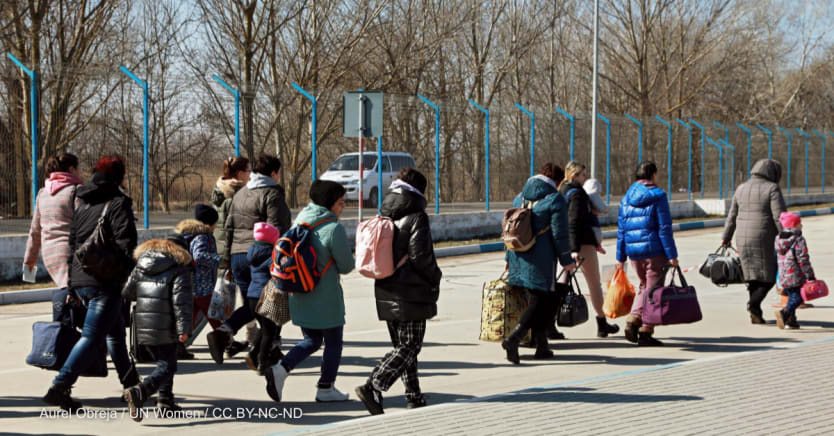
The war in Ukraine has also been a frontal assault on health and human rights. Amid the invasion by Russian President Vladimir Putin’s military, tens of thousands of Ukrainian civilians have been killed, hundreds of health facilities have been attacked, and humanitarian corridors have been shelled.
Food has been used as a weapon of war. Laying siege to Mariupol and blocking food aid, the bombed-out city’s residents who had not escaped or been killed by bombs or bullets faced starvation. By blockading sea ports, Russia is preventing Ukraine from exporting crucial food supplies — including more than 20 million tons of grain — turning an already bubbling global food crisis into a full-scale global disaster.
Last month, the World Health Organization’s governing body, the World Health Assembly, responded — the same time independent experts concluded that Russia was responsible for inciting genocide in Ukraine. WHA’s response showcased global disgust with Russia’s actions, but also numerous countries’ unwillingness to prioritize health and human rights over narrowly construed interests.
War is a health issue — and all the more so where one party attacks civilians, health infrastructure, and humanitarian corridors.
—At its annual meeting, WHA — comprising all 194 WHO member states — faced competing resolutions on Ukraine: one sponsored by nearly four dozen countries, the other put forward by Russia and Syria. Both called for respecting humanitarian law, unhindered access for health and humanitarian personnel, and contributions to WHO’s emergency appeal for Ukraine and countries hosting refugees.
Yet the difference between the two resolutions was definitive. Only the first condemned Russian aggression and opened the door to future sanctions against Russia. That resolution passed handily, with 88 member states in favor and 12 opposed. But 53 countries abstained, while 30 were absent. The vote on Russia’s resolution was largely the mirror image: 15 member states in favor, 66 opposed, and 70 abstentions.
Supporters applauded when the first resolution passed. Condemning a WHO member state by name is exceedingly rare at WHA. But the larger story is deeply disturbing: While a large number of countries are willing to condemn apparent crimes against humanity and push Russia further from the community of nations, a very sizable group of countries refuse to do so.
Amid abstentions, support for Ukraine and rejection for Russia at WHA
Eighty-eight nations at the World Health Assembly voted to condemn Russia's military operation in Ukraine, calling it “a serious impediment to the health of the population."
Incredibly, even as Russia adds to its attacks on health and human rights by the day, and the global suffering this is causing becomes ever greater, the global picture has changed little during the course of the war. Consider that the United Nations General Assembly resolution in early April similarly demanding respect for humanitarian law received more votes in favor and fewer in opposition — 140 compared with 5.
Perhaps some states did not see WHO as an appropriate forum for condemning Russia. But WHO is exactly the right forum for condemning ceaseless attacks on health facilities. WHO is exactly the right forum for condemning bombs that cause mass death and grievous injuries among civilians, for condemning acts that cause hunger and starvation.
War is a health issue — and all the more so where one party attacks civilians, health infrastructure, and humanitarian corridors, while also weaponizing food. WHO should be the world’s health defender. The states governing it must not muffle its voice.
What’s more, while the U.N. General Assembly voted to suspend Russia from the U.N. Human Rights Council with immediate effect, WHA decided only that if Russia continued acting “to the detriment of the health situation in Ukraine, at regional and global levels,” it might take further action under WHO’s constitution, likely meaning suspending Russia’s vote in WHA.
WHA doesn't meet again until next May. Meanwhile, some member states have had their votes suspended in WHA, the vast majority because they are in arrears on paying their dues. Gambia owes less than $30,000, Somalia, less than $15,000. Aren’t Russia’s actions a greater offense to the world’s health than a low-income nation owing WHO paltry sums?
The must-read weekly newsletter for exclusive global health news and insider insights.
Ironically, the people of the countries that abstained from the voting, many in Africa, the Middle East, and Asia, will suffer most from the soaring food prices due to Russia’s naval blockade. As World Food Programme Executive Director David Beasley warned, “Failure to open those ports … will be a declaration of war on global food security. And it will result in famine and destabilization and mass migration around the world.”
After more than three months of carnage, how many more deaths — in Ukraine, but also around the world — will it take for governments that have not yet done so to have the courage to sanction Russia? If governments fail to do so, their publics should make clear that they are on the side of health and human rights — principles that must be applied impartially to all countries, but to which their governments must not be neutral.
Health and human rights are on the side of peace and health. They are not against the people of Russia, but against Putin, his government, and his military, for whom civilians are fair game for their bombs, and the world’s poorest people their hostages as Russia weaponizes food. The WHA vote should serve as a call to action that it is past time for governments to side unwaveringly with health and human rights.










